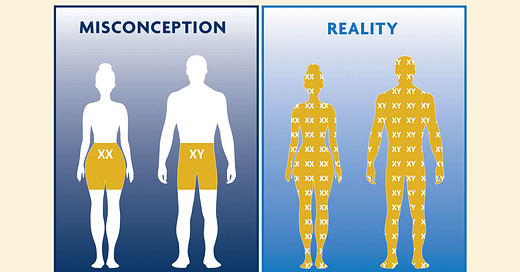Kia ora Mark Potter and Chris Abercrombie,
We invite you to read this letter with open minds and the knowledge that many thousands of parents share the concerns we express.
In recent weeks, as leaders of the NZEI (primary) and PPTA (secondary) teachers’ unions, you have expressed concern about the government’s plans to remove and replace the Relationships and Sexuality Education (RSE) Guide in schools. You have variously described the plan as “scary”, “frightening” and “dangerous” and have claimed to be mystified about what the problem is that needs fixing.
This open letter from Resist Gender Education (RGE) is intended to enlighten you on the latter point. RGE is a group of former and practising teachers, parents, and other concerned citizens, who support relationships and sexuality education when it is scientifically accurate. We consider the current RSE Guide to be the real “frightening” and “dangerous” influence in schools because it promulgates scientific falsehoods and encourages experimental psycho-medical practices to be carried out on children.
Humans cannot change sex
The ideology being taught in schools – the problem that needs fixing – is the transgender extremist belief that humans can change sex. This is not true, and children should never be taught such a destabilising lie.
If you are part of the small minority of people who avow that humans literally can change sex, please describe the process by which this happens. How do testes stop producing sperm and instead start producing ova (or vice versa)? How is the new ova-producing male able to gestate a foetus in the uterus he has magically grown? It is so obviously ludicrous that very few adults would defend such an idea, yet this is the message being absorbed by our children when they are taught from pre-school that “sex is assigned at birth” and sometimes the adults make a mistake.
Much of the confusion for children caused by our current RSE is due to the very sloppy use of the words ‘sex’ and ‘gender’ in the teaching resources. For decades, these words have been used interchangeably in everyday speech, without much difficulty. But now that children are being told that a person’s internal ‘gender identity’ is more significant than their physical ‘sex’, the distinction between the words is of utmost importance, yet the RSE Guide repeatedly conflates the two and provides baffling definitions.
What does the Guide mean when it says a “gender fluid” person is one “whose gender changes over time and can go back and forth”? When it says that gender is on a spectrum and that “sex, gender, and sexuality might change over a lifetime”, does the Guide mean a person’s physically sexed body is on a spectrum and can change or just that a person’s gender expression may alter? (See p48 RSE Guide Y1-8)
Constantly telling children that gender can change, without correctly defining the word, leads them to believe that it is their sex that can change. Instead of learning that gender nonconformity is a personality trait that is no big deal, children are learning that their bodies can and should be altered to match sexist stereotypes – that a boy who likes wearing a ribbon in his long hair is really a girl and can literally become one, and a girl who never wears dresses ought to radically alter her body to confirm she is truly a boy.
On this one point alone, replacing the RSE Guide is imperative. A new Guide needs to be written, using language of unambiguous clarity, that is grounded in the indisputable fact that sex is binary and immutable.
But that is not all…
A brewing medical scandal
Creating confusion around sex and gender is bad enough, but even worse is the way some schools and teachers are encouraging young children to act on their discomfort and make decisions that may have lifelong consequences. Some teachers are even inserting themselves as greater authorities in a child’s life than their parents by keeping secret a child’s social transition (the adoption of clothing and pronouns associated with the opposite sex).
Allowing social transition at school is not a neutral act, as explained in the Cass report – the 2022 independent UK review into gender identity care.
…it is important to view it [social transition] as an active intervention because it may have significant effects on the child or young person in terms of their psychological functioning. There are different views on the benefits versus the harms of early social transition. Whatever position one takes, it is important to acknowledge that it is not a neutral act, and better information is needed about outcomes. (p62)
In the last few months, Professor Sallie Baxendale, a UK Clinical Neuropsychologist, has cited evidence that puberty blockers may have a detrimental effect on a child’s IQ; the RANZ College of Psychiatrists has said, “The benefits and potential harms of both medical and psychosocial interventions for TGD [trans and gender diverse] children and young people have limited evidence”; and the WHO has made a similar statement.
As union leaders, it is important that you keep yourselves up to date with these and other pronouncements about gender identity issues, to avoid your unions blundering even further into supporting this brewing medical scandal where trusted adults are leading impressionable children down a path towards a lifetime of medical dependency.
The RSE Guide and the MOE policies that accompany it must be urgently replaced with ones that confirm the fundamental human right of children to go through a natural puberty and of their parents to be fully involved in decisions about their care.
Guidelines for schools
In December 2023, the Department of Education in England published draft guidelines on how schools should manage gender questioning children. Some of the common-sense recommendations were:
Teachers should not initiate or suggest to a child that they socially transition.
Parents have a right to know if their child wishes to socially transition (unless there are exceptional circumstances).
The impact on the wider school of social transition should be considered.
Children and teachers should not be made to use ‘preferred pronouns’.
Single-sex spaces and sports should be retained.
In our Briefing Document to the new Minister of Education, RGE asked for similar guidance to be issued for NZ schools. It is not the role of teachers to tell children that it is easy and joyful to change sex and to introduce them to risky medical interventions like puberty blockers.
Criticism of schools is not unfair
Mark Potter says teachers have received “unfair criticism” from parents who have “false ideas” about what is being taught. Such parental misunderstandings about RSE are the direct result of the jargon and ideological content in the RSE Guide and the often poor communication from schools about exact RSE lesson content.
The community consultation that is supposed to take place every two years, in many cases is no more than a tick-box exercise. It is no wonder then, that parents feel betrayed and confrontational when they discover, by chance, that the ‘human reproduction’ lessons they had agreed to use the Family Planning resource that shows reproductive organs without male or female labels because, the children are told, a boy can have a vulva and a girl can have a penis. Parents are also angered by statements in teaching resources like this one: “if you’re thinking that girls and women are the only ones who menstruate, then you’d be wrong” (p24)
As parents are not experts in the structure of the curriculum, when they see the heading in the RSE Guide for Curriculum Level 1 that says, “Understanding and skills to enhance relationships, for example, in relation to friendships, intimate relationships, love, families, and parenting.” [emphasis added], it is not surprising that they think five-year-olds are to be taught about sexual intimacy.
Instead of criticising parents for being "unfair", schools need to dramatically improve their communication and explain that the heading refers to the topics that will be covered over the next 8 years of schooling. Schools must rebuild the trust of parents by being fully transparent about what is being taught in RSE, including by sharing all the resources – discussion topics, worksheets, posters, videos, books, and speakers – that will be used before the lessons start.
Time for a secret ballot
How many teachers truly believe the tenets of gender identity ideology?
Both the NZEI and the PPTA have enthusiastically adopted gender identity policies, on the back of union votes about accepting diversity and protecting students from bullying. Few people would question those motives, but it is not necessary to teach transgender dogma in order to achieve acceptance - see RGE’s alternative lesson plans for Curriculum Levels 1-4.
Do teachers really believe that children can choose their sex and it is determined by sexist stereotypes?
Do they agree that children should be expected to lie in school about another child’s sex and be censured if they make a mistake?
Do they think it is ethical to exclude parents from knowledge about their child’s social transition at school?
RGE challenges you to put these questions in a secret ballot to your union members so that the many teachers who disagree with gender ideology are able to express their views without fear of being ostracised in their workplaces or losing their jobs.
There is no mystery about why the RSE Guide needs to be urgently rewritten. It teaches unscientific beliefs as if they are facts and undermines parental rights. The sooner it is disentangled from our whole education system, the better.
Ngā mihi nui
Resist Gender Education








Excellent letter, thanks RGE team! Socially transitioning children is an iatrogenic intervention, that far from giving children time to think about what sex they "want" to be, actually cements in delusional thinking. As you so rightly point out, sex is not a choice and using gender as an interchangeable word just confuses children (which is being done deliberately). This sort of "education" also removes all safeguarding from children and allows adults to use children for their own purposes as it teaches children to ignore the reality they see, in favour of an adult imposed fantasy.
Creating a fictional world for children is wrong if this is presented as something they can actually do: https://lucyleader.substack.com/p/the-alternative-universe-offered
such fine explanation. Thank you for writing so well to people we are relying on.
I also like how Kemi Badenoch, in U.K., pointed out that "A young person and their family may notice that they are gender non-conforming earlier than they are aware of their developing sexual orientation. If gender non-conformity is misinterpreted as evidence of being transgender and a child is medically affirmed, the child may not have had a chance to identify, come to terms with or explore a same-sex orientation.”